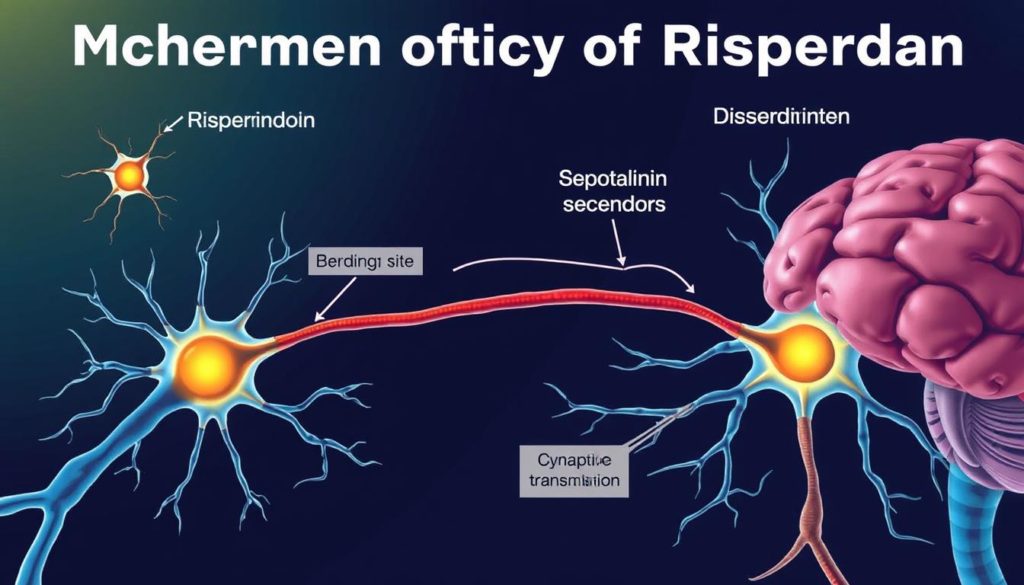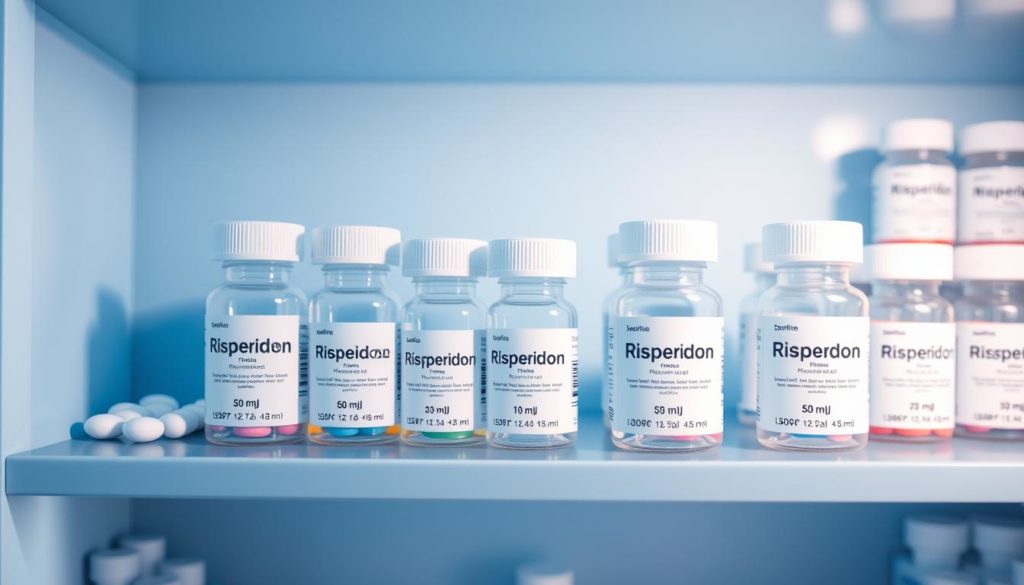Did you know over two million Americans take Risperidon (Risperdal) every year? This antipsychotic medication is key in treating schizophrenia, managing bipolar disorder, and helping those with autism spectrum disorder. It balances dopamine and serotonin in the brain. This helps control mood and thoughts. It brings relief to many facing mental health conditions.
While the benefits are important, it’s key to know about Risperdal effects as well. You should understand proper use and possible side effects. This guide covers what you need to know about Risperidon. It aims to help you use it wisely for better health.
Introduction to Risperidon (Risperdal)
Risperidon is also known by its brand name, Risperdal. It’s a mental health medication used a lot. It’s especially good for treating conditions like schizophrenia, bipolar disorder, and autism-related irritability.
One key benefit of Risperidon is it helps balance brain chemicals. This balance is important for mental stability and well-being. Knowing how this medication works can really improve its use.
Risperidon acts on brain neurotransmitters. These neurotransmitters send messages between nerve cells. By adjusting their activity, symptoms lessen and mental health improves.
Below is a table summarizing some key details about Risperidon:
| Parameter | Details |
|---|---|
| Brand Name | Risperdal |
| Generic Name | Risperidon |
| Main Uses | Schizophrenia, Bipolar Disorder, Irritability in Autism |
| Formulations | Tablets, Liquid, Injection |
| Common Dosages | Varies (Based on Specific Condition and Patient Response) |
Knowing all about Risperidon helps a lot in treating mental health issues. With the right knowledge, healthcare providers and patients can decide better. This ensures the best possible results from this important medication.
How Risperidon (Risperdal) Works
Risperidon, known by its brand Risperdal, is used often for psychiatric problems. It works well for many symptoms by changing neurotransmitter action in the brain.

Mechanism of Action
The Risperidon mechanism of action is about blocking certain brain receptors. It targets the receptors for dopamine and serotonin. This helps control mood, thinking, and behavior. The way it impacts both pathways is key to its success in treating mental health issues.
Target Conditions
Risperidon has several key uses in psychiatry. Here are the main ones:
- Risperdal for schizophrenia: It cuts down on hallucinations, delusions, and confusing thoughts.
- Bipolar disorder medication: Risperidon evens out mood swings and stops manic episodes.
- Behavioral problems in autism: It is also used to lessen irritability and aggression in autistic kids.
These Risperidon target conditions show it’s a major player in treating many mental health issues. It’s a significant asset in mental health care.
Dosage and Administration of Risperidon
To get the best results from Risperidon, it’s important to follow the doctor’s instructions closely. Knowing the right Risperidon dosage and how to take Risperdal properly is key. This helps in getting the benefits and reduces side effects.

Dosage Guidelines
The Risperidon dosage is set based on what each person needs. The dose starts low and can be raised as needed. For instance:
- Adults usually start with 1 mg twice daily. If needed, the dose can go up by 1-2 mg per day.
- For kids, the dose is based on their age and weight. It starts low and adjusts over time.
- The elderly begin with a lower dose, like 0.5 mg twice a day, then it may be increased slowly.
Administration Instructions
Taking Risperidon the right way is crucial for it to work best. You can take it with food or without. But try to take it at consistent times. Other important tips are:
- Take it at the same time each day.
- Don’t split or crush the tablets unless your doctor says it’s okay.
- Make sure kids taking it are watched to avoid mistakes or misuse.
Missed Doses and Overdosage
If you forget to take a dose, take it as soon as you remember. But if it’s almost time for your next dose, skip the missed one. Avoid taking two doses at once. To prevent Risperdal overdoses, know the signs like extreme sleepiness, fast heart rate, or fainting. Get medical help right away if these happen.
Following these guidelines on Risperdal administration carefully, and knowing what to do if doses are missed or too much is taken, is crucial. It ensures the treatment is both safe and effective, helping the patient’s health.
Potential Side Effects of Risperidon
Risperidon is an effective antipsychotic medication. But, it’s crucial to know the possible side effects. It includes both mild and severe ones.
Common Side Effects
Patients using Risperidon might face several common side effects.
- Drowsiness
- Upset stomach
- Weight gain
These side effects can be handled with a doctor’s help. Patients should watch how their bodies react to the medication.
Serious Side Effects
Some reactions to Risperidon are more serious. Patients should watch out for:
- High blood sugar
- Neuroleptic malignant syndrome
- Involuntary motor symptoms
Knowing these and seeking help quickly is crucial. Both patients and caregivers must learn about Risperidon’s side effects.
Interactions with Other Medications
Risperidon, also known as Risperdal, can interact with different medications. It’s important to know these interactions to avoid problems and make sure the medicine works well. Let’s look at which medications we should not mix with Risperidal.
Medications to Avoid
When using Risperidon, it’s key to avoid certain medicines to prevent bad health effects. Drugs that lengthen the QT interval, like antiarrhythmics (e.g., amiodarone, quinidine), some antibiotics (e.g., moxifloxacin), and antipsychotics (e.g., chlorpromazine), are risky. Also, mixing Risperidon with drugs that cause a lot of sedation, such as benzodiazepines (e.g., diazepam) or opioids, can increase sedation too much.
Possible Interactions
Risperidon interactions include prescription and over-the-counter medicines. For example, using Risperidal with blood pressure drugs might lower your blood pressure too much. If you take it with antidepressants like SSRIs (e.g., fluoxetine), your body might end up with different levels of Risperidon. Also, taking antiepileptics, such as carbamazepine, can make Risperdal less effective. So, it’s important to watch out for these medication interactions carefully.
| Drug Category | Example Medications | Possible Interactions |
|---|---|---|
| Antibiotics | Clarithromycin, Erythromycin | Increased risk of heart rhythm issues |
| Antidepressants | Fluoxetine, Paroxetine | Increased Risperidon levels |
| Antiepileptic Drugs | Carbamazepine | Decreased Risperidon efficacy |
| Antihypertensives | Atenolol, Enalapril | Enhanced blood pressure-lowering effects |
Risks and Precautions
Understanding the risks and necessary precautions of Risperidon is vital. This is especially true for those with heart disease, seizures, or diabetes. Knowing these issues is key.
Precautions for Specific Conditions
Before taking Risperidon, important factors need consideration. For instance, heart disease, seizures, and diabetes can affect how the drug works in your body. Discussing Risperdal precautions with a doctor ensures underlying health issues are managed well.
Medical experts often share guidelines to follow when taking Risperidon. These tips help monitor possible Risperidon risks. By adhering to these guidelines, patients can minimize side effects and enjoy better outcomes.
Pregnancy and Breastfeeding
The use of Risperidon during pregnancy and breastfeeding is a key concern. Balancing treatment benefits against risks requires careful consultation with healthcare providers.
Information specific to medication use during pregnancy and Risperidone breastfeeding information should be clear. Pregnant women and new mothers need to communicate closely with their doctors. This ensures the health and safety of both mother and baby.
Special Considerations for Older Adults
Prescribing antipsychotics in older adults needs a careful approach. This is to ensure their safety and the medication’s effectiveness. Special attention is needed for Risperidal use in the elderly because of higher side effect risks like dizziness, QT prolongation, and sensitivity to hot and cold.
Older individuals might be more sensitive to Risperidon geriatric considerations. This means doctors need to watch their patients closely. They should start with a small dose and only increase it slowly, watching for any bad reactions.
It’s also key to keep these patients well-hydrated and comfortable temperature-wise. This helps deal with their increased sensitivity to extreme temperatures. Providing a supportive setting and regular check-ups also helps ensure their safety.
Taking careful and detailed steps with Risperidal elderly use improves how well the treatment works. It’s crucial for making sure older adults get the medication’s benefits with fewer risks.
Storing and Disposing of Risperidon
Handling Risperidon correctly is key for its effectiveness. We need to store it in a stable place, safe from light. Throwing it away properly stops misuse and helps our environment.
Storage Guidelines
To store Risperidon right, keep it in a cool, dry spot. Avoid sunlight and wet areas. It should stay at room temperature, between 68°F to 77°F. Make sure it’s in a sealed container, far from kids and pets.
Disposal Instructions
Getting rid of Risperidon requires caution. We should follow local rules, like returning it to a pharmacy or a take-back program. If that’s not possible, mix it with something nasty, like coffee grounds, then throw it away. Only flush it if you’re told to by official advice.
By sticking to these rules, we ensure our meds are stored and tossed safely. This protects our health and the planet.
Conclusion
Exploring the Risperdal treatment overview teaches us about its uses and effects. A brief look at Risperidon summary shows its key role in mental health care. It’s vital to weigh its benefits against possible side effects when looking at treatment options.
It’s crucial to follow dosage and administration rules closely. This helps get the best results while lowering risks. Also, working closely with healthcare experts is key, particularly when considering final thoughts on antipsychotic medication. Patient safety and health are the main focus. This underlines the importance of medical advice during treatment.
To sum up, using Risperidon in treating mental health needs a lot of knowledge and careful use. The information shared here aims to help in making smart choices. This should lead to better care for patients.
References and Further Reading
Those interested in knowing more about Risperidon (Risperdal) can find a lot of information. You can learn about its official uses, how it works, and the side effects from various scientific sources. A key place for detailed info is the National Center for Biotechnology Information.
Research articles on Risperdal share knowledge on its action in the body and its effectiveness. They cover conditions like schizophrenia and bipolar disorder. These articles also help healthcare workers and patients use it well while handling side effects.
By looking at the Risperidon resources mentioned here, you can dive into clinical trials and FDA approvals. They give a full view of how Risperdal works and its safety. These details are crucial for anyone wanting to fully understand how to use this important medication safely and effectively.
FAQ
What is Risperidon (Risperdal) used for?
Risperidon, also known as Risperdal, is a medicine for schizophrenia, bipolar disorder, and autism behavior issues. It balances brain chemicals to help regulate mood and thoughts.
How does Risperidon (Risperdal) work in the brain?
Risperidon adjusts neurotransmitters, focusing on dopamine and serotonin. These chemicals affect mood, thinking, and behavior. Balancing them helps with mental health problems.
What are the common side effects of Risperidon?
Side effects of Risperidon can include feeling sleepy, stomach upset, and gaining weight. It’s key to watch for side effects and talk to a doctor if they happen.
Are there serious side effects associated with Risperidon?
Serious side effects exist, like high blood sugar and neuroleptic malignant syndrome. If you notice powerful motor symptoms or others, get medical help right away.
What are the dosage guidelines for Risperidon?
With Risperidon, you start with a low dose that increases slowly. This approach reduces risks. Take it consistently, food or no food, as your doctor says. Kids’ doses may vary.
What should I do if I miss a dose of Risperidon?
Missed a Risperidon dose? Take it when you remember. If it’s nearly time for the next one, just skip it. Don’t take two doses at once. Keep to your schedule.
Can Risperidon interact with other medications?
Risperidon may affect or be affected by other drugs, especially those affecting the heart’s QT interval or that could increase side effects. Always talk about new meds with your doctor.
What precautions should be taken with Risperidon?
People with heart issues, seizures, or diabetes need to be cautious with Risperidon. Talk to your doctor about using it if you’re pregnant or breastfeeding. Keeping track of your health while on it is important.
Are there special considerations for older adults taking Risperidon?
Older adults might get more dizzy, have heart issues, or react strongly to temperatures with Risperidon. They need a special plan and close watch from doctors.
How should I store and dispose of Risperidon?
Keep Risperidon in a cool, dry place away from sun and moisture. Properly throw away old or unused medicine following your area’s rules to avoid misuse and harm to the environment.


